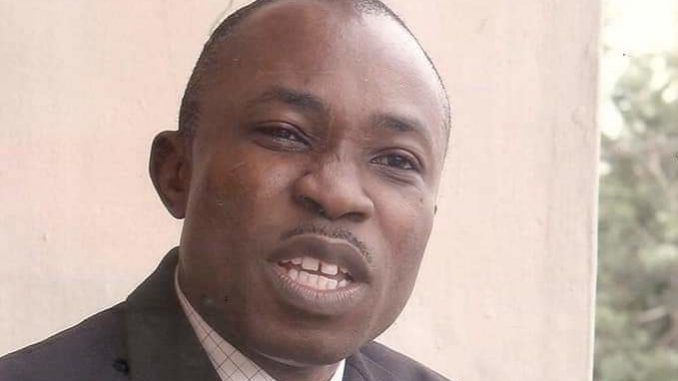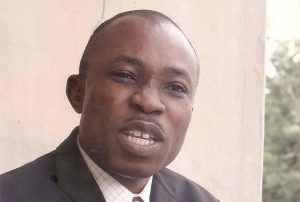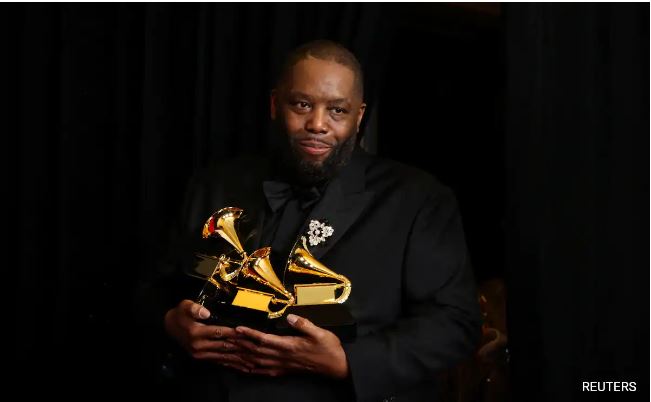
Paul O Of ‘Living In Bondage’ Fame Says “Story About my life”.

FOR generations to come and for students of the motion picture industry, they will never forget in a hurry the man who changed the face of movie-making in Nigeria and gave the sector an industry today known as Nollywood.
Thirty years ago, he changed the narrative of filmmaking with his hit classic, Living in Bondage followed by other successful films. He thereafter ‘disappeared’ for another 30 years to show up with another globally recognized epic flick; Amina which has received more international recognition and awards than local ones. In this interview with SAM ANOKAM, Okey Ogunjiofor speaks extensively about his latest effort, the industry, and the next frontier of Nollywood.
We call you by your character name Paulo, how did that name evolve?
Paul O actually is my name. My English name is Polycarp, that is where the name came from, Paul O. My name is Okechukwu, my surname is Ogunjiofor. So, like I answered my name in another film, Circle of Doom too, I always use my names in most of my films. Paul O is my real name. However, when we grow, sometimes we prefer to answer our vernacular names to have that cultural connection to our roots. Presently, I like to be addressed simply as Okey Ogunjiofor.
Before we go back memory lane, let us talk about your current work that is making waves, Amina.
I started Amina on 8, August 1996. That was when I wrote the first letter to the presidency through the office of the then First Lady, Maryam Abacha who was in office at that moment because they just returned from Beijing conference and were talking about women empowerment and all that. I wrote a letter to them to say that I can partner with them to create a content, a narrative directing peoples’ minds towards the women folk. They responded that I should come over for the defense. I went. Don’t forget that before the advent of Christianity and Islam, we saw mostly women rule in the African continent. We had Queen Nefertiti of Egypt (1292 BC); Makeba, Queen of Sheba (960 BC), and Empress Candence of Ethiopia (323 BC). Later, we had Queen Amina of Zazzau (c. 1533 – 1633); Queen Anna Nzinga of Angola (c. 1583 – 1663); Yaa Asante Boa of Ashanti Kingdom of Ghana (c.1830-1921); Queen Sarraounia Mangou of Niger (19th Century), Ranavalona of Madagascar; Queen Beatrice of the Congo, to name a few.
So, the question is, at what point did Africa lose it to the extent that the white folks are now the ones selling women empowerment to us, teaching us how to raise our girl children, and teaching us gender equality?
Those were very pungent questions on my mind and I put them forward at the presidency that I had research that I would want to put into a film to empower our women, especially our children, and then answer certain questions so that the white people will know that it didn’t start from them. Isn’t it an irony that each time the white people take something from us, they simply repackage it back to us and claim ownership? They take cocoa from us repackage it and it becomes chocolates and other expensive beverages; they take our gold, repackage it, it becomes some expensive ornaments; they take our crude oil, repackage it and it becomes some fuel that is unaffordable to the poor; they take our sugar cane, our palm oil and so on. It gave me the opportunity to present the story of the African women in such a way that they could understand.
RELATED NEWS
Reactions As PSquare Pushes Fan Off Stage During Performance
They asked me how I intended to do that. I said to them, one woman epitomizes everything and she is Queen Amina of Zaria. She was a very young lady. Amina’s story is full of controversy as some people believed she never lived, some believed she lived but that she was a hermaphrodite taking men for sexual satisfaction and killing them once they see her nakedness – a lot of controversies! They asked if it is such a person you want to raise as a role model for women? I said, that is where the research comes in because in the public domain people are hearing and reading a lot of things that may not be true. We have to go back to the seven kingdoms of the north, the 13 emirates of the north, the custodians of history to tell us what they know so that we can come up with the real story – the truth. They said, okay, but they would not give me money, that I would have to do the research funding myself. I was prepared to make that sacrifice on my own. I requested something from them, that since they will not give me money can they at least give me letters of introduction to all the emirs, all the custodians of culture, all the professors or those who should know in the north so that I can get easy access to them. They did a letter on the presidency letterhead partnering with my company – Videosonic Studios Limited, and another introducing us to all concerned asking that they grant us audience.
In the company of my researcher, Mr. Sola Ojewusi, a journalist who lived in the north, I moved. Two of us began this challenging journey. It was a daunting task for years because there were bottlenecks, doors were not opening even with the letters. We were delayed, frustrated. Two southern persons coming to discuss Amina was something hard for them to chew. Nobody wanted to tell or give us any story to advance that cause and we didn’t understand why until later – they felt a story of such would adversely affect them. However, we continued. Sometimes we would stay in an emir’s palace for two weeks patiently waiting for audience, or lodging in a hotel and coming in daily and when they got fed up, they would direct us to one place to another to meet some of their custodians of history. We got all that we could from Kwara to Jos to Zaria, Turunku, Suleja, Dass, Kaduna, to Bauchi up to Kano etc. We spoke to them and we came up with the authentic story in the book, Amina. All through the research we noticed that there were no major books except a few plays on Amina. No effort to document her achievements and all that you hear. This book became one of the things that we did and when we finished, one of the eminent Princes who was the custodian of culture, Doctor of Literature, Alhaji Nuhu Bamalli, (CFR) the Magajin Garin Zazzau, (he is late now but his son is the present Emir of Zaria), wrote his recommendation of the book for us. All the emirs and kings that we spoke to also gave us authentication letters for the Amina story. My idea first and foremost for embarking on this project is to empower the girl child especially in the northern part of Nigeria and the whole world. It was to emphasize that we have capacity in these women to contribute positively to nation building, they have done it before and they can still do it tomorrow. Afterall, the symbol of justice in any law court anywhere in the world is a woman. When we empower them, they will contribute their quota to make the world a better place.
The second thing is that there is this dichotomy between the northern and southern film industry called Kanywood and Nollywood. They don’t mix. Their stories don’t cross each other. We have a very big market that is untapped but because of this dichotomy, mindset, and struggle, we don’t have a big ecosystem for every practitioner. I wanted to build a bridge deliberately across the Niger so that 86 southern crew members went to the north and chose about 1000 actors and together we told the story of a northern woman and released it to the whole world and it is causing commotion. By doing so we are pointing the way forward that when we collaborate, the north and the south, we can come up with something that would be phenomenal; but when we are divided, we cannot really achieve.
This is a statement I am trying to make to say that the south needs the north and the north needs the south because there are things they can do that we cannot do and things we can do that they cannot do. But when we come together, we would be able to project something that will be meaningful to the whole world and that is why the whole world is celebrating Amina today. Yesterday, while I was here someone is talking about a film festival in Carthage that he wants Amina to come, another one is talking about another festival somewhere else, different countries because Amina has become something that Nigerians can be proud of.
How did you fund such a huge project?
One of the reasons it took a long time was that we were trying to raise funds. When we took it to the presidency in 1996 the bill was N40m but when eventually we finished the production, we spent something quite very huge. We took loans from Bank of Industry Nollyfund; we got grants from ProjectAct Nollywood and Ford Foundation. I don’t like to say exactly how much because it is still an ongoing concern, inputs are still being made but you can be sure that we didn’t spend so much. When I shot this film, the dollar was still N195/1$ in 2015 and we spent well over N200m then in shooting, that was well over $1 million USD. When you add the cost of post-production done in Canada and San Francisco later, we were netting up to $1.2 to $1.3m. But that was a long time ago; today, that money would run into hundreds of millions.
When was it shot?
We started in 2015 and finished January 2016. We started post-production 2017 ending and finished 2019. Only the visual effect took a long time in Canada and the sound design also took six months in USA. We brought in additional equipment with the loans and grants I mentioned above. Of course, the loan and grants were seed money for me to start and while shooting was going on, investors began coming in. That was how we had money to complete the shoot and post-production.
Were you surprised at the reception?
I was not surprised. I am a risk taker. I don’t just do things. I do things whenever where the industry is going is clear to me. In 1992 when I did Living In Bondage, people were doing home videos. My friend Muyideen Aromire of blessed memory was doing home videos then. Even Kenneth Nnebue had done a home video titled Aje N’Iyami directed by late Hamid Oguntade, Jaguar was doing something also, late Solomon Eze (Mike Ori Ihedimma) in the east was also doing some exciting things but we hadn’t an industry.
Other big shots like Pa Ogunde, Mr. Adeyemi Josiah Afolayan, (Ade Love) Brendan Shehu, Eddie Ugbomah, etc were all shooting pure celluloid films but it never was an industry. What was the problem? Money and technical know-how! Film-making technics was never professionally democratized neither was it inclusive nor pocket-friendly for the younger generations to practice till Living in Bondage came. It was like an elitist club, a closed circuit of people who protected their trade from outsiders.
Anytime people do stuffs without thinking of how that would affect others or benefit the future generations, they don’t download bigger stuffs from above. It is only when your idea will impact nations and glorifies God that He gives you something bigger than you, something that could change the status quo. Early enough as a Christian, I knew that God always wants to change the environment through people for the greater of other people. In the early ’90s each time we went to the national theatre (Abe Igi), we would gather, nothing to do. So, I said to myself, we can’t die here. There has to be a way out to break away from this hunger and joblessness. There was no job, cinemas were in comatose, nothing was working, films were not being made and stage was not what one can depend on. How many times would you have to rehearse a stage play (maybe months) and perform for one day and you are paid pittance? Was that what we were going to depend on? There has to be a way to demystify celluloid and make it more inclusive and pocket friendly, and that was what we did. Those who were making films with VHS cameras then tried. The only difference was that they were not doing it professionally. While in school, we were taught how to use cameras to make films professionally. We brought in that professionalism into filmmaking and then boom, a breakaway success story. It became an industry-recognized across the world since Living in Bondage in 1992.
I was in my other office one afternoon in 2008, I don’t know how God speaks to people but I know how He speaks to me. I just heard Him, and in one second the trajectory of Nollywood was clear to me. He said, just (like somebody that was lecturing), He said: ‘From inception till today, Nollywood has gone through three epochs and it is about to move into the fourth and final epoch in 2013.
The first epoch was 1992 to 1998, that was the producers’ market when the producers passionately determined what stories they told. He talked about the next epoch which was the marketers’ market. In the first epoch, producers produced what they felt was the best, professionally, to create value for the audience, and soon the marketers hijacked it from them and began to produce what the marketers liked in order to create value for themselves. It was no longer quality, no longer story, no longer professionalism – but gain became their drive, profit their motive. The market crashed. Then we entered the third epoch which was the viewers’ market when New Metro appeared on the scene followed by Silverbird cinemas and the market bounced back with Stephanie Okereke’s Through the glass, Chineze Anyaene’s “Ije” and Mahmood Ali Balogin’s Tango with me and others from that moment up to 2013. God said to me, that the viewer’s market was going to continue into 2013, and beyond the viewer’s market that Nollywood was going to get to a place called the investors market. He said I should make a film to herald that fourth epoch. The investors market is the place where more money will be chasing the few who can create global stories with universal sounds that would drive eyeballs to the cinemas and put money into the bank accounts and pockets of their investors.’
Amina had been researched and kept over the years. I just took it. In 2013, I began to ask God where the money will come from. Dr. Ngozi Okonjo-Iweala, the coordinating Minister of Nigeria then rebased our economy and said Nollywood was a game changer that and they will energize it with some grants for filmmakers.
Source | The Nation






Leave a Reply